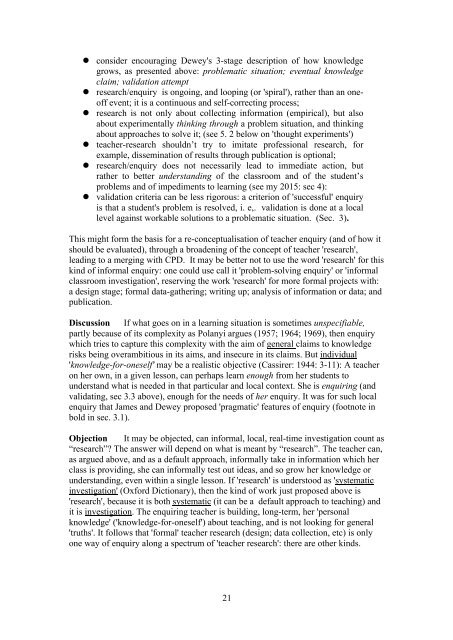RADICAL TEFL
2hqhXJd
2hqhXJd
Create successful ePaper yourself
Turn your PDF publications into a flip-book with our unique Google optimized e-Paper software.
l consider encouraging Dewey's 3-stage description of how knowledge<br />
grows, as presented above: problematic situation; eventual knowledge<br />
claim; validation attempt<br />
l research/enquiry is ongoing, and looping (or 'spiral'), rather than an oneoff<br />
event; it is a continuous and self-correcting process;<br />
l research is not only about collecting information (empirical), but also<br />
about experimentally thinking through a problem situation, and thinking<br />
about approaches to solve it; (see 5. 2 below on 'thought experiments')<br />
l teacher-research shouldn’t try to imitate professional research, for<br />
example, dissemination of results through publication is optional;<br />
l research/enquiry does not necessarily lead to immediate action, but<br />
rather to better understanding of the classroom and of the student’s<br />
problems and of impediments to learning (see my 2015: sec 4):<br />
l validation criteria can be less rigorous: a criterion of 'successful' enquiry<br />
is that a student's problem is resolved, i. e,. validation is done at a local<br />
level against workable solutions to a problematic situation. (Sec. 3).<br />
This might form the basis for a re-conceptualisation of teacher enquiry (and of how it<br />
should be evaluated), through a broadening of the concept of teacher 'research',<br />
leading to a merging with CPD. It may be better not to use the word 'research' for this<br />
kind of informal enquiry: one could use call it 'problem-solving enquiry' or 'informal<br />
classroom investigation', reserving the work 'research' for more formal projects with:<br />
a design stage; formal data-gathering; writing up; analysis of information or data; and<br />
publication.<br />
Discussion If what goes on in a learning situation is sometimes unspecifiable,<br />
partly because of its complexity as Polanyi argues (1957; 1964; 1969), then enquiry<br />
which tries to capture this complexity with the aim of general claims to knowledge<br />
risks being overambitious in its aims, and insecure in its claims. But individual<br />
'knowledge-for-oneself' may be a realistic objective (Cassirer: 1944: 3-11): A teacher<br />
on her own, in a given lesson, can perhaps learn enough from her students to<br />
understand what is needed in that particular and local context. She is enquiring (and<br />
validating, sec 3.3 above), enough for the needs of her enquiry. It was for such local<br />
enquiry that James and Dewey proposed 'pragmatic' features of enquiry (footnote in<br />
bold in sec. 3.1).<br />
Objection It may be objected, can informal, local, real-time investigation count as<br />
“research”? The answer will depend on what is meant by “research”. The teacher can,<br />
as argued above, and as a default approach, informally take in information which her<br />
class is providing, she can informally test out ideas, and so grow her knowledge or<br />
understanding, even within a single lesson. If 'research' is understood as 'systematic<br />
investigation' (Oxford Dictionary), then the kind of work just proposed above is<br />
'research', because it is both systematic (it can be a default approach to teaching) and<br />
it is investigation. The enquiring teacher is building, long-term, her 'personal<br />
knowledge' ('knowledge-for-oneself') about teaching, and is not looking for general<br />
'truths'. It follows that 'formal' teacher research (design; data collection, etc) is only<br />
one way of enquiry along a spectrum of 'teacher research': there are other kinds.<br />
21


